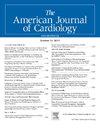The Impact of Inclisiran on Lipid Profiles in Adults with Hyperlipidemia: A Meta-Analysis and Meta-Regression of Randomized Controlled Trials
IF 2.1
3区 医学
Q2 CARDIAC & CARDIOVASCULAR SYSTEMS
引用次数: 0
Abstract
Hyperlipidemia is one of the most prominent risk factors for heart diseases, and current treatments are sometimes insufficient to control it. Inclisiran, a small interfering RNA targeting proprotein convertase subtilisin/kexin type 9 (PCSK9), provides a novel, long-acting approach to improve hyperlipidemia. This meta-analysis was conducted following the PRISMA guidelines. A total of 5 out of 185 studies screened met the inclusion criteria. The primary outcome was a reduction in the LDL-C level compared to control group. Statistical analysis used a random-effect model to calculate the mean difference (MD) for with 95% confidence interval (CI). A total of 5 randomized controlled trials comprised 4,072 patients, divided into the Inclisiran arm (n = 2,129) and the Control arm (n = 1,943). Compared with control, this study showed Inclisiran substantially reduces LDL-C (MD, −51.25%; 95% CI, [−56.58 to −45.92], p <0.00001), total cholesterol (MD, −27.75%; 95% CI, [−30.39 to −25.10], p <0.00001), apolipoprotein B (MD, −36.65%; 95% CI, [−45.93 to −27.37], p = 0.00039), triglycerides (MD, −12.39%; 95% CI, [−21.49 to −3.28], p = 0.02275), PCSK9 level (MD, −77.00%; 95% CI, [−86.89 to −67.11], p = 0.00014), and lipoprotein (a) (MD, −21.77%; 95% CI, [−24.29 to −19.24], p = 0.000018). Inclisiran also significantly increases HDL-C levels by a mean difference of +5.86% (MD, 95% CI, [+4.77 to +6.95], p = 0.0001). This meta-analysis demonstrates that Inclisiran significantly improves lipid profiles in hyperlipidemia, reducing LDL-C, total cholesterol, apolipoprotein B, triglycerides, PCSK9, and lipoprotein (a), while increasing HDL-C levels. Its innovative mechanism and twice-yearly dosing enhance efficacy, safety, and patient adherence.
斜西兰对成人高脂血症患者血脂的影响:随机对照试验的荟萃分析和荟萃回归
高脂血症是心脏病最重要的危险因素之一,目前的治疗方法有时不足以控制它。Inclisiran是一种靶向枯草杆菌蛋白转化酶/kexin 9型(PCSK9)的小干扰RNA,为改善高脂血症提供了一种新的、长效的方法。本荟萃分析遵循PRISMA指南进行。185项研究中有5项符合纳入标准。主要结果是与对照组相比LDL-C水平降低。统计分析采用随机效应模型计算95%置信区间(CI)的均值差(MD)。共有5项随机对照试验,包括4072名患者,分为Inclisiran组(n = 2129)和Control组(n = 1943)。与对照组相比,本研究显示Inclisiran显著降低LDL-C (MD, -51.25%;95% CI, [-56.58 ~ -45.92], p
本文章由计算机程序翻译,如有差异,请以英文原文为准。
求助全文
约1分钟内获得全文
求助全文
来源期刊

American Journal of Cardiology
医学-心血管系统
CiteScore
4.00
自引率
3.60%
发文量
698
审稿时长
33 days
期刊介绍:
Published 24 times a year, The American Journal of Cardiology® is an independent journal designed for cardiovascular disease specialists and internists with a subspecialty in cardiology throughout the world. AJC is an independent, scientific, peer-reviewed journal of original articles that focus on the practical, clinical approach to the diagnosis and treatment of cardiovascular disease. AJC has one of the fastest acceptance to publication times in Cardiology. Features report on systemic hypertension, methodology, drugs, pacing, arrhythmia, preventive cardiology, congestive heart failure, valvular heart disease, congenital heart disease, and cardiomyopathy. Also included are editorials, readers'' comments, and symposia.
 求助内容:
求助内容: 应助结果提醒方式:
应助结果提醒方式:


